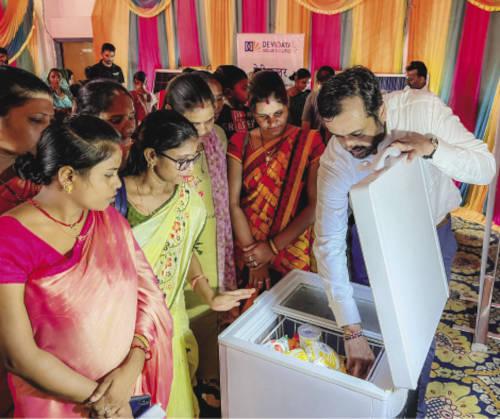A new generation of social entrepreneurs are building these DRE products. Rather than retro-fitting existing products into DRE power sources, this generation is actually custom-building products from scratch that are perfectly fit for purpose. The entrepreneurs understand the value chains they work in very well, and many of their innovations come from the insights they gather on the field.
Akash Agarwal, who runs New Leaf, put in the cycle-flipping switch after he realised that the cold room was lying idle for some parts of the year, when it could well be used for drying left-over produce. Another entrepreneur, Vasanth Kamath, whose company Hydrogreens makes solar-powered fodder-growing units, noticed that his product was mostly operated by women. He then reduced the height of the unit to bring the upper trays of fodder within their reach.
There is a large potential market for DRE livelihood appliances. A report released by CEEW (Council on Energy, Environment and Water) and Villgro Innovations Foundation in May 2023 estimates that India has a $50 billion market for clean technologies, which can impact 37 million livelihoods. This market continues to grow even as the quality of the power grid in the country improves. The demand for DRE products, driven initially by the need for reliable electricity, is today increasingly fuelled by aspiration and entrepreneurial spirit.
In many cases, the cost over their lifetime of DRE powered livelihood appliances beats that of their grid powered counterparts. The customer base is expanding too. Since DRE products are decentralised by design, they are much more gender inclusive. Installations are close to homes or farms, so women micro-entrepreneurs can use them while balancing their domestic responsibilities.
Powering livelihoods
The challenge for the DRE Livelihoods sector is to convert the latent demand into actual on-ground sales and installations. Back in 2020, the Powering Livelihoods programme was kicked off, jointly designed and executed by Villgro and CEEW to address exactly this challenge. The programme adopted a holistic approach to scaling the sector. On the supply side, Powering Livelihoods worked with 14 innovative social enterprises, helping them to scale their operations and fine-tune their business models.
On the demand side, the programme created digital awareness campaigns, user experience centres and ‘demo champions’, who were active users willing to explain a DRE product to other people. The programme also actively engaged with the ecosystem around DRE Livelihoods – from the ministries responsible for framing policies related to DRE, to financiers who would provide loans to users interested in buying the products.
The programme has had several notable successes. Until May 2023, Powering Livelihoods had enabled over 11,000 installations of DRE Livelihoods appliances, which in turn enhanced the livelihoods of over 17,500 users. Almost all of these installations happened through commercially viable business models, which means the enterprises making them also grew in revenue – on an average, by 2.3 times over three years (including through the difficult Covid period). The data from these 11,000 installations was meticulously documented and shared with the Ministry for New and Renewable Energy (MNRE). This and other inputs formed the basis for the world’s first ever
formal policy framework for DRE Livelihoods, released by MNRE in 2022. R.K. Singh, Union minister for power, new & renewable energy, announced at the National Summit on Powering Sustainable Livelihoods in May 2023 that the government had plans to create a large programme for DRE Livelihoods.
Yet, there remains a lot of work to be done in the sector. Enterprises struggle to take their DRE products deep into rural areas. As young companies, they lack the staff strength to set up sales and service networks on their own. One of Powering Livelihoods’ major thrust areas going forward, is to set up strong networks of go-to-market (GTM) partners.
Rural distribution is a space that has seen a lot of innovation lately, and the program has partnered with companies like Essmart and Dharmalife who are adopting digital platforms and payment systems to rapidly expand their coverage area for DRE Livelihoods products.
Affordability is another major concern. Most prospective customers are convinced of the earning potential of DRE products, but lack the capital to purchase them. It is essential that these products are bundled with financing schemes – loans that allow users to pay in instalments. Powering Livelihoods has already established several ‘lighthouse’ projects that showcase how DRE Livelihoods and financing can go together.
For example, over 200 units of solar powered refrigerators manufactured by Mumbai-based Devidayal Solar, have been sold via a loan scheme offered by a prominent non-banking finance corporation (NBFC). Schemes like this often need added risk coverage when they start off – first loss default guarantees or FLDGs in bankers’ parlance – but once borrowers start paying their instalments regularly, the financiers do away with such requirements. The programme aims to bring many more end-user financing organisations into the sector, to catalyse faster uptake of DRE Livelihoods products.
Over the next two years, Powering Livelihoods aims to build a mature ecosystem for DRE livelihood technologies, where stakeholders have sufficient data and case studies to be convinced of the commercial viability of DRE Livelihood solutions as well as the impact they create. The aim is to have at least 40,000 more livelihoods enhanced by these solutions, with at least 25 innovative and profitable enterprises building products to suit their needs.
The programme aims to catalyse many more go-to-market players and financiers to operate in the sector. The programme also hopes to inspire convergence of government policy across ministries when it comes to schemes – with not just MNRE but others like the ministries of agriculture, food processing industries and textiles, among others, considering DRE as an integral part of their schemes.
Most importantly, Powering Livelihoods aspires to enable tens of thousands of people like Somnath Kharade to adopt decentralised renewable energy for their livelihoods. They will form the core of India’s army of climate warriors, who clean up the environment even as they earn their living.




































